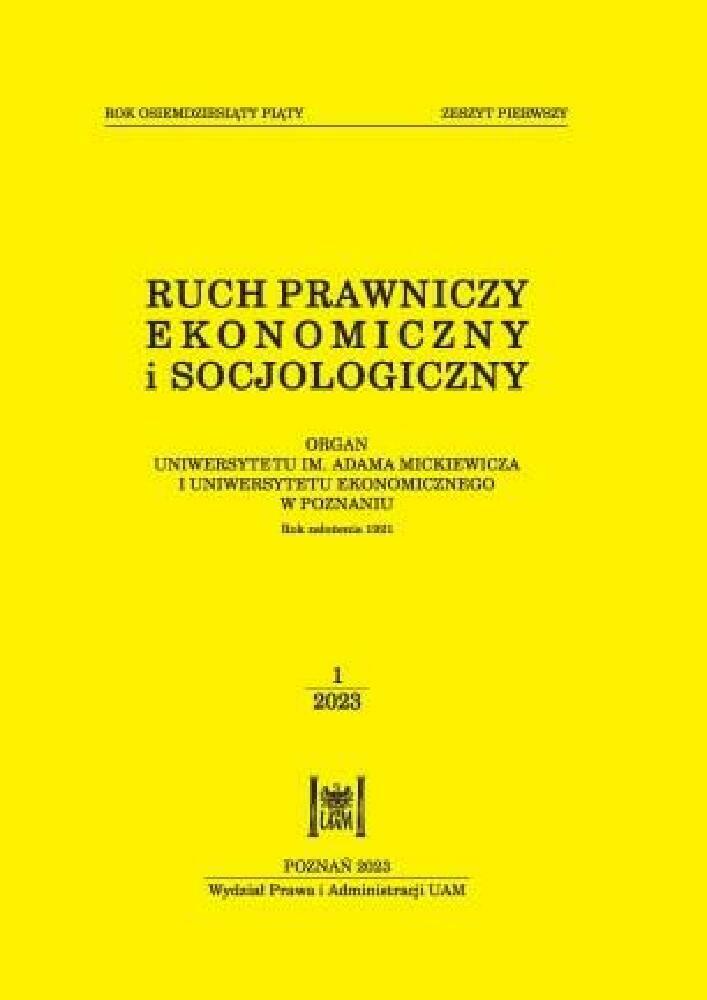Abstrakt
The involvement of the public authorities in socio-economic processes serves to achieve the objectives of the adopted policy of the State (or, respectively, the European Union). The state’s policy devised to foster socio-economic development is an instance of active state interventionism. In Polish legislation, this policy has been defined by the legislator as development policy. The aim of this paper is to demonstrate that public procurement is an instrument for achieving the strategic objectives of the development policy, thus drawing on the concept of ‘strategic use of public procurement’: a particular notion of the role of public procurement in the context of the strategic approach to development. One of the premises here is that a specific public goal – whose achievement is desirable from the standpoint of public procurement law – should serve to achieve the strategic objectives of development policy law. The article underscores the instrumental (albeit crucial) nature of public procurement with respect to state policy. For the purposes of the study, it was assumed that failure to appreciate the essence of using public procurement in the pursuit of strategic development objectives will adversely affect the consistency of public objectives and, consequently, result in incoherent actions. In this context, the author assesses the provisions of the Public Procurement Law, which provides the grounds for the adoption of the national purchasing policy that emphasizes the relevance of linking public procurement with the achievement of state objectives. The article shows that the introduction of the obligation to prepare a state purchasing policy and linking this document with the system of strategic development planning confirms the strategic use of procurement, which should serve the implementation of important public interests.
Bibliografia
Andhov, M. (2021). Contracting Authorities and Strategic Goals of Public Procurement – A Relationship Defined by Discretion? https://papers.ssrn.com/sol3/papers.cfm?abstract_id=3794794.
Bator, A. (1992). Normy planowania gospodarczego w systemie prawa. Wrocław.
Blay, M. (2014). The strategic use of public procurement in support of innovation. European Procurement & Public Private Partnership Law Review 9(1): 3–11.
Blicharz, R. (2013). Rozdział I § 3: Źródła publicznego prawa gospodarczego. In R. Hauser, Z. Niewiadomski, A. Wróbel (ed.), System prawa administracyjnego. Vol. 8A: Publiczne prawo gospodarcze (pp. 27–40). Warsaw.
European Commission (2017). Study on ‘Strategic use of public procurement in promoting green, social and innovation policies’: final report. EC Publications Office. https://data.europa.eu/doi/10.2873/8480. DOI: https://doi.org/10.21552/epppl/2017/3/5
Grabowski, J. (2013). Rozdział I: Prawo a gospodarka. In R. Hauser, Z. Niewiadomski, A. Wróbel (ed.), System prawa administracyjnego. Vol. 8A: Publiczne prawo gospodarcze (pp. 4–26). Warsaw.
Grosse, T.G. (2008). Zintegrowane podejście do rozwoju – rola polityki spójności [Integrated Approach to Development: The Role of Cohesion Policy]. Warsaw.
Hettne, J. (2013). Strategic use of public procurement – limits and opportunities. Swedish Institute of European Policy Studies. European Policy Analysis 2013:7: 1–20.
Jarnicka, J. (2022). [Komentarz do art. 21 PZP]. In M. Jaworska, D. Grześkowiak-Stojek, J. Jarnicka, A. Matusiak, Prawo zamówień publicznych. Komentarz. 4th edn. [Online]. Warsaw: C.H. Beck.
Jeżewski, J. (2004). Polityka administracyjna. Zagadnienia podstawowe. In A. Błaś, J. Boć, J. Jeżewski (eds.), Administracja publiczna (pp. 5–19). Wrocław.
Kahlenborn, W., Moser, Ch., Frijdal, J., Essig, M. (2011). Strategic Use of Public Procurement in Europe, Final Report to the European Commission MARKT/2010/02/C. https://www.adelphi.de/en/system/files/mediathek/bilder/strategic-use-public-procurement-europe_en.pdf.
Kania, M. (2018). Mikro, mali i średni przedsiębiorcy w zamówieniach publicznych kilka propozycji de lege ferenda. Acta Universitatis Wratislaviensis 3833, Przegląd Prawa i Administracji 114: 513–531. DOI: https://doi.org/10.19195/0137-1134.114.33
Kiczka, K. (2013). O praktyce ograniczania wolności działalności gospodarczej. In J. Grabowski, K. Pokryszka, A. Hołody-Wydrzyńska (eds.), 25 lat fundamentów wolności działalności gospodarczej. Tendencje rozwojowe (pp. 330–343). Katowice.
Kieres, L. (2014). Społeczna gospodarka rynkowa w orzecznictwie Trybunału Konstytucyjnego. In T. Kocowski, J. Gola (eds.), Przedsiębiorca w społecznej gospodarce rynkowej (pp. 180–192). Wrocław. DOI: https://doi.org/10.15611/pn.2014.372.14
Kokocińska, K. (2014). Prawny mechanizm prowadzenia polityki rozwoju w zdecentralizowanych strukturach władzy publicznej. Poznań.
Kokocińska, K. (2017). Regulowanie normami prawa prowadzenia polityki rozwoju celów zamówień publicznych. In M. Kania, P. Nowicki, A. Piwowarczyk (eds.), Modernizacja zamówień publicznych. Geneza nowelizacji ustawy Prawo zamówień publicznych z 22 czerwca 2016 roku (pp. 65–78). Warsaw.
Kokocińska, K. (2019). Integrated programming in national development. Ruch Prawniczy, Ekonomiczny i Socjologiczny 81(4): 139–149. DOI: https://doi.org/10.14746/rpeis.2019.81.4.11
Kosikowski, C. (2018). Współczesny interwencjonizm. Warsaw.
Kulesza, M., Sześciło, D. (2013). Polityka administracyjna i zarządzanie publiczne. Warsaw.
Łętowski, J. (1983). Miejsce i funkcje planowania w działalności administracji. Studia Prawnicze 1(75): 3–34.
Panasiuk, A. (2019). Dobre prawo zamówień publicznych, mrzonki czy realna przyszłość. In J. Niczyporuk (ed.), Procedura zamówień publicznych (pp. 109–114). Lublin.
Powałowski, A. (2017). Społeczna gospodarka rynkowa w prawie polskim. Gdańskie Studia Prawnicze 37: 51–62.
Rabska, T. (2009). Działania administracji publicznej w świetle współczesnej koncepcji publicznego prawa gospodarczego. In B. Popowska, K. Kokocińska (eds.), Instrumenty i formy prawne działania administracji gospodarczej (pp. 15–34). Poznań.
Strzyczkowski, K. (1985). Administracyjnoprawne instytucje planowania. Warsaw.
Supernat, J. (2005). Zarządzanie. Wrocław.
Zdyb, M. (2016). Aksjologiczne podstawy ingerencji państwa w sferę gospodarki rynkowej. In A. Powałowski (ed.), Prawne instrumenty oddziaływania na gospodarkę (pp. 1–13). Warsaw.
Licencja
Prawa autorskie (c) 2023 WPiA UAM

Utwór dostępny jest na licencji Creative Commons Uznanie autorstwa 4.0 Międzynarodowe.





